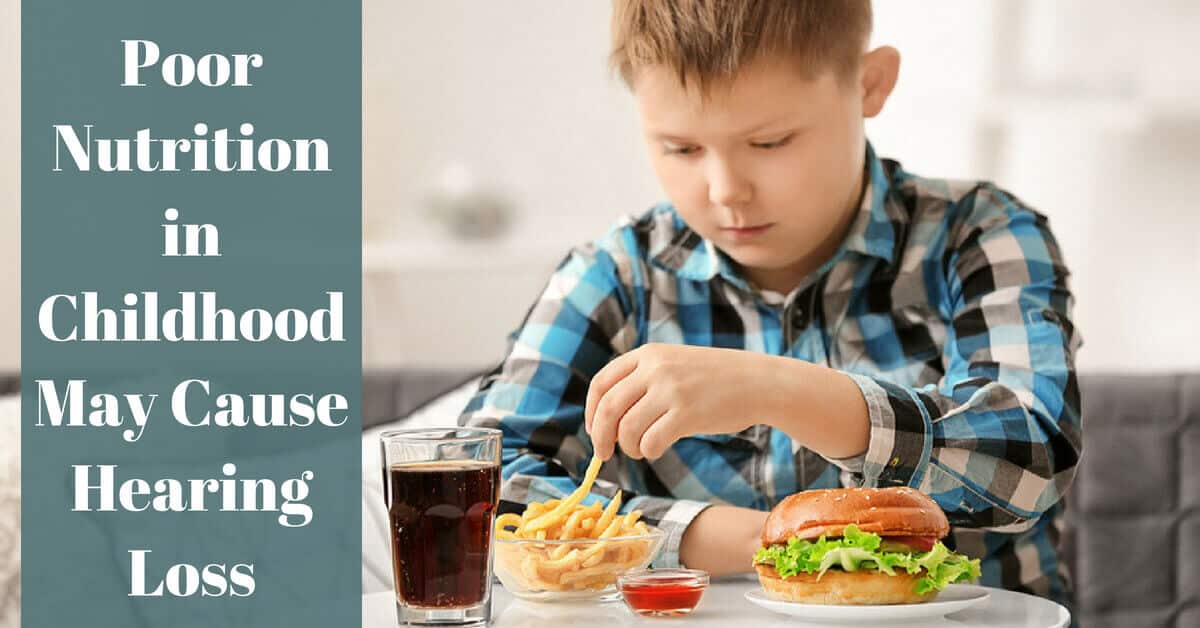One of the top three public health issues, hearing a health condition that effects 48 million Americans, or one fifth of the population. As Baby Boomers continue to age, our country’s populations with hearing loss will only increase as age-related hearing loss begins to take its toll on sizable generation. This is as expected, really, as up until now one third of those over the age of 65 report some degree of hearing loss.
But is hearing loss a condition that could spike in younger generations as well? Recent research published in the American Journal of Clinical Nutrition found that young adults not given proper nutrition in early childhood were much more likely to report hearing loss than their peers.
The importance of nutrition in early childhood…
According to the Centers for Disease Control (CDC), poor nutrition in early childhood can lead to a host of health complications later in life. These future problematics might include cardiovascular disease, cancer, osteoporosis and diabetes. And it’s not only during childhood. The habits and diet of a child’s mother during pregnancy can have a significant impact on future health and development, sometimes lasting a lifetime.
…and its effect on hearing loss
Perhaps surprisingly, this recent study revealed that the long-term implications of poor nutrition during pregnancy and early childhood extend into doubling the predisposition for hearing loss later in life. In this particular study, researchers at the John Hopkins Bloomberg School of Public Health examined the correlation between nutritional levels and hearing loss in thousands of participants. Using a population of 2,200 young adults in Nepal, these subjects were existing participants in a nutritional trial conducted between 1989 and 1991 when they were in early childhood.
After testing their hearing between 2006 and 2008, researchers concluded that those children who were stunted in childhood were almost twice as likely to show some degree of hearing loss. Stunting is a chronic condition of poor nutrition and undernourishment in early childhood or even before birth in which the person is too short for one’s age. Beyond being shorter than average for their age, other growth is similarly impacted. Researchers suspect that inner ear development is just one area in which there is a failure to properly develop. This may cause or greatly contribute to the hearing loss later in life as the inner ear is responsible for full hearing health. Moreover, malnourishment may result in underweight children, which can increase risk for developing ear infections. Chronic ear infections are a known cause of hearing loss.
Good nutrition at home
Providing a good model for our kids is the best way to ensure that they are getting the right nutrients in their diet and continue that habit when they beyond our watchful eyes. The United States Department of Agriculture (USDA) has a wonderful resource of science-based nutritional information that is available at www.choosemyplate.gov. Using a plate as a visual guide, this graphic allows for easy and vibrant lessons for children about nutrition and making healthy choices.
Food insecurity and poor nutrition
Poor nutrition in the United States can occur in almost any corner of the map. But it’s food insecurity, or the problem of not being economically able to provide enough food, that is the leading cause of poor nutrition. The USDA states that over 12% of families in the country were food insecure in 2016. That number accounts for almost 14 million children who go hungry because their family lacks the resources to afford the food that they need.
Ways to help
Recognizing the prevalence of food insecurity in the United States can be shocking, but there are ways to individually help. Nearly every community has some type of food bank that alleviates the pressure of providing enough food for families in which money is tight. If there isn’t one in your own city or town, you might try looking at neighboring towns to see if their food bank is looking for a donation. Moreover, many churches and social clubs have already established programs that collect food or monetary donations for those experiencing food insecurity. Who knows? The food you donate today might just be what saves someone’s hearing for decades to come!
Experiencing a Hearing Loss?
Visit us at Desert Valley Audiology for comprehensive hearing tests and hearing aid fittings.

